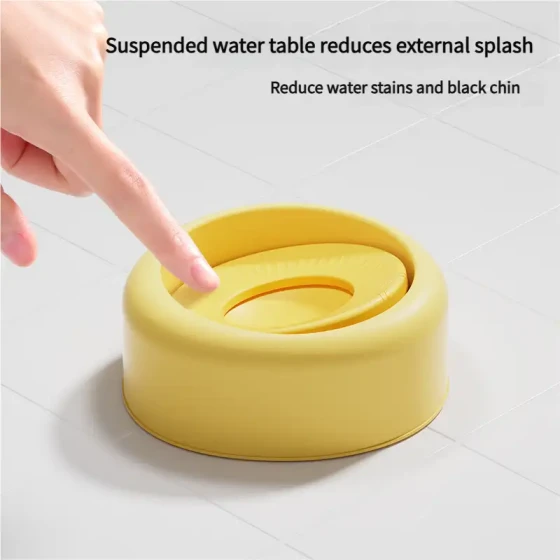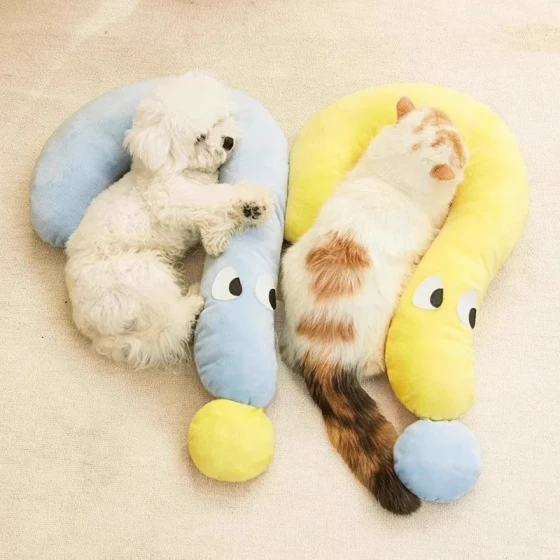How long after birth can kittens be dewormed_Best time and precautions for kitten deworming
Deworming newborn kittens is an important step to ensure their healthy growth. Generally, kittens can undergo a basic internal deworming at around 4 weeks old, mainly targeting roundworms and hookworms. Afterwards, a regular deworming schedule should be formulated according to the parasite lifecycle and the specific conditions of the cat, typically followed up at 8 and 12 weeks old, and then monthly or quarterly. External deworming is generally recommended to start when the kitten is 2 months old and weighs at least 500 grams.
When you first bring home a little kitten, besides providing tasty food and drinks, cat owners are probably most worried about the "invisible" parasites. These little critters sometimes hide on our shoe soles, clothes, or in dark and damp corners at home, and can easily take up residence on the kitten if we're not careful. Parasite infections are not trivial; mild cases cause skin itching and hair loss, severe cases lead to allergic dermatitis, lethargy, loss of appetite, vomiting, diarrhea, and other symptoms. Therefore, regular deworming is a "must-learn course" to ensure cats grow up healthy and happy.
So, how old do newborn kittens need to be before they can be dewormed? What precautions should be taken? Don't worry, let's reveal everything step by step.

Kitten Deworming, Is Earlier Always Better?
For kittens, because their immune systems are not fully developed and resistance is weak, they are more susceptible to parasite infections. Some parasites can even be transmitted to kittens through mother's milk. Therefore, it is very necessary to deworm kittens as early as possible.
Generally speaking, kittens can have their first "basic" internal deworming at 4 weeks after birth. This stage mainly targets some common intestinal parasites like roundworms and hookworms. However, the types of parasites that can be removed at this time are limited.
As kittens grow, the frequency of deworming and choice of medication will vary. Many sources recommend starting monthly internal deworming once the kitten is 8 weeks old and continuing until 6 months old. Some opinions hold that when the kitten is about 2 months old and weighs at least 500 grams, external deworming can be started. As for external parasites like fleas and ear mites, due to their short life cycles, external deworming typically requires monthly treatment.
Key point: The timing of a kitten’s first deworming is not fixed and should consider the kitten’s health condition, weight, and environment. The safest approach is to consult a professional veterinarian and formulate a suitable deworming plan based on the cat’s specific situation.
Kitten Deworming Schedule (Reference)
Although specific deworming plans require veterinary guidance, a general schedule is as follows:
- Around 4 weeks old: First internal deworming (mainly targeting roundworms and hookworms).
- 8 weeks old: Second internal deworming and start external deworming if necessary.
- 12 weeks old: Third internal deworming.
- Before 6 months old: Monthly internal and external deworming.
- After 6 months old: Enter adult cat deworming stage with reduced frequency.
It should be noted that this schedule is not rigid; if the kitten shows obvious parasite infection symptoms or lives in a high-risk environment (e.g., frequent contact with other animals or outdoor exposure), more frequent deworming may be needed.
Understanding Internal and External Parasites in Kittens for Effective Deworming
Understanding the types of parasites kittens may be infected with helps us conduct better deworming. Common internal parasites in kittens include:
- Roundworms: The most common internal parasite in kittens, possibly causing diarrhea, vomiting, malnutrition, abdominal swelling, and other symptoms. Kittens can be infected through mother's milk or ingestion of eggs.
- Hookworms: Attach to the intestinal wall to suck blood, possibly causing anemia, weight loss, diarrhea (sometimes with blood). Larvae can enter through skin penetration as well as oral or maternal milk transmission.
- Tape worms: Look like grains of rice and are often found in or around the cat’s stool or anus. Cats are usually infected by ingesting fleas carrying tape worm larvae.
- Coccidia and Giardia: These are unicellular protozoa, mainly causing diarrhea and indigestion; severe infections may lead to dehydration and weight loss. Cats usually get infected by consuming contaminated food, water, or contact with contaminated feces.
Common external parasites for kittens include:
- Fleas: Cause skin itching and allergic dermatitis; severe infestations can cause anemia, especially in kittens.
- Ear mites: Cause itching and head shaking, with dark discharge inside the ears.
Precautions for Kitten Deworming Every Cat Owner Should Remember
Deworming kittens is not simply giving medicine casually; there are many “tricks” to pay attention to:
- Choose appropriate deworming medicine: There are many deworming products on the market. Internal dewormers come in tablets and oral liquids, whereas external dewormers are mainly spot-on drops or sprays. Different medicines target different parasites, usage methods, and applicable age and weight. Always choose products specifically designed for cats, never use dog dewormers as some ingredients (e.g., permethrin) are toxic to cats. It is best to choose and use under veterinary guidance.
- Strictly follow dosage: Deworming medicine dosages are usually calculated based on the cat’s weight. Follow the instructions or vet’s guidance precisely; overdose or underdose can affect efficacy or harm your cat’s health.
- Master correct administration methods: Some cats resist medicine administration. For internal tablets, you can gently open the mouth and feed directly or use a pill feeder. Crushing tablets and mixing with tasty food may also work, but some cats are sensitive to flavor and may refuse. External deworming drops are usually applied on the back of the neck where the cat cannot lick.
- Pay attention to timing: Internal dewormers are best given 3-4 hours after eating, and fasting for 5-6 hours post-administration helps ensure effectiveness. Avoid bathing within one week before or after applying external deworming drops to prevent reducing efficacy.
- Observe the cat’s reaction: After deworming, some weak cats may show mild vomiting, diarrhea, lethargy, which is a normal reaction caused by the toxic effect on dying parasites stimulating the gut, usually subsiding within 1-2 days. You can appropriately fast the cat to reduce intestinal burden or give probiotics under veterinary guidance. Seek veterinary help if reactions are severe or prolonged.
- Avoid deworming during special periods: Pregnant and lactating cats require cautious deworming; safe medications should be chosen under vet advice. Sick, weak, anemic cats or those just vaccinated should wait for recovery before deworming. Ideally, leave at least a one-week gap between vaccination and internal deworming.
- Environmental hygiene is equally important: Even with regular deworming, cleanliness cannot be ignored. Regularly clean the litter box and disinfect floors to reduce parasite eggs in the environment, effectively lowering the risk of reinfection.
Frequently Asked Questions
- Q1: My cat never goes outside, does it still need deworming?
A: Yes. Even strictly indoor cats can be exposed to parasite eggs brought in on owners' shoes, clothes, or through food and water. Regular deworming is still necessary. - Q2: How can I tell if my cat has parasites?
A: Symptoms of parasite infection vary widely, including diarrhea, vomiting, loss of appetite, weight loss, abdominal swelling, rough coat, itching, blood in stool, or visible worms. Some infections show no obvious symptoms. The most accurate method is to take the cat to a hospital for fecal examination. - Q3: Can internal and external deworming be done simultaneously?
A: Some medicines treat both internal and external parasites simultaneously. If using different medicines, it is usually recommended to space them apart or follow veterinary advice. - Q4: Will deworming medicine harm my cat?
A: All medicines have potential side effects, but with proper selection under veterinary guidance, correct dosage, and administration, and monitoring the cat’s reaction, the risks are controllable.
Conclusion
Deworming newborn kittens is an indispensable step on their path to healthy growth. As responsible cat owners, we must care for our “fur babies” attentively, understand the best timing and precautions for kitten deworming, choose appropriate products, and follow instructions strictly. If any doubts or abnormalities occur, be sure to consult professional veterinarians in time. Protect the kitten’s health from parasites and let them happily frolic!
References
- Sina News. How to deworm kittens? When to deworm? Detailed tutorial for new cat owners. 2024-03-05.
- Moreson. "Kitten Care - Battle Manual.5" Medical Section: Vaccination, Deworming, Neutering. 2021-08-13.
- Sina Finance. Rational discussion: How often to deworm cats? 2021-10-05.
- SMZDM.com. Cat Deworming Precautions. 2024-04-16.
- SMZDM.com. All about cat deworming explained clearly in one article! 2022-03-16.
- esccap.org. Scheme for individual deworming of cats.
- PetMD. Deworming Kittens: Why It's Important and When To Start. 2024-04-26.
- Pawlicy Advisor. Kitten Deworming Schedule: When, Why & How To Deworm Cats.
- Kitten Lady. GI parasites — Kitten Lady.
- esccap.org. ADDITIONAL TREATMENTS FOR CATS.
- Royal Pet Food. Internal parasites in cats.
- Anhui Finance Network. How often should cats be dewormed and what pitfalls to avoid? 2022-03-22.
- Royal Canin UK. Internal parasites in cats. 2018-10-02.
- Cat Backyard. At what age can cats be dewormed? Complete analysis on correct frequency and medication skills! 2024-10-02.
- SMZDM.com. Suggested to bookmark! This article is enough for deworming your kitten at home. 2023-04-25.
- Fairview Animal Hospital. Cat Deworming: Protect Your Feline & Family.
- NetEase. Common cat parasites and how to deworm correctly? Cat owners, stop wasting effort. 2020-07-01.
- Langley Animal Clinic. Dog Deworming. 2024-02-02.
- NetEase. At what age can kittens be dewormed and kitten deworming precautions? 2018-12-19.
- Sina News. I Walk: Detailed explanation of cat deworming issues, after reading this no cat illnesses. 2022-09-05.
- Pet Lovers' Network. When can cats be dewormed? 2023-03-16.
- Companion Veterinary Clinic. 7 Things to Know About Deworming Your pets. 2016-05-13.
- University Veterinary Teaching Hospital Sydney. Intestinal worms - University Veterinary Teaching Hospital Sydney.
- Pawlicy Advisor. Common Parasites In Kittens & Cats: Symptoms To Watch Out For.
- PetMD. Worms in Cats. 2024-03-26.
- American Veterinary Medical Association. Intestinal parasites in cats and dogs.
- SMZDM.com. Kitten Deworming: When should little furballs start? 2024-09-30.
- MeinArztbedarf.com. Comparison of cat deworming products and best choices. 2025-03-14.
- Sina. IDeck: At what age can cats be dewormed. 2020-12-11.
- Pet Hospital. When can cats be dewormed? 2025-02-06.
- An’an Pet Hospital. Treatment methods for internal cat parasites [Types of cat parasites]. 2019-08-06.
- Cornell University College of Veterinary Medicine. Gastrointestinal Parasites of Cats.
- Kitten Network. Kittens' parasites and how to handle them. 2023-01-13.
- Forever Love Rescue Inc. Foster Guide - Deworming.
- How long between deworming pets.
- Sina Finance. What to pay attention to in kitten external deworming? 2022-01-04.
- Bull Pharmaceuticals. When to deworm kittens? Kitten deworming precautions.
- Fenben.pro. Fenbendazole for kittens: Safety and precautions. 2025-02-22.
- Sina Finance. Do you really know the precautions for internal deworming in cats? 2022-01-06.
- Deworming Products Comparison, our cat prefers this one!
- China Youth Network. How to deworm cats and dogs. 2017-04-22.
-560x560.webp)

-560x560.webp)


